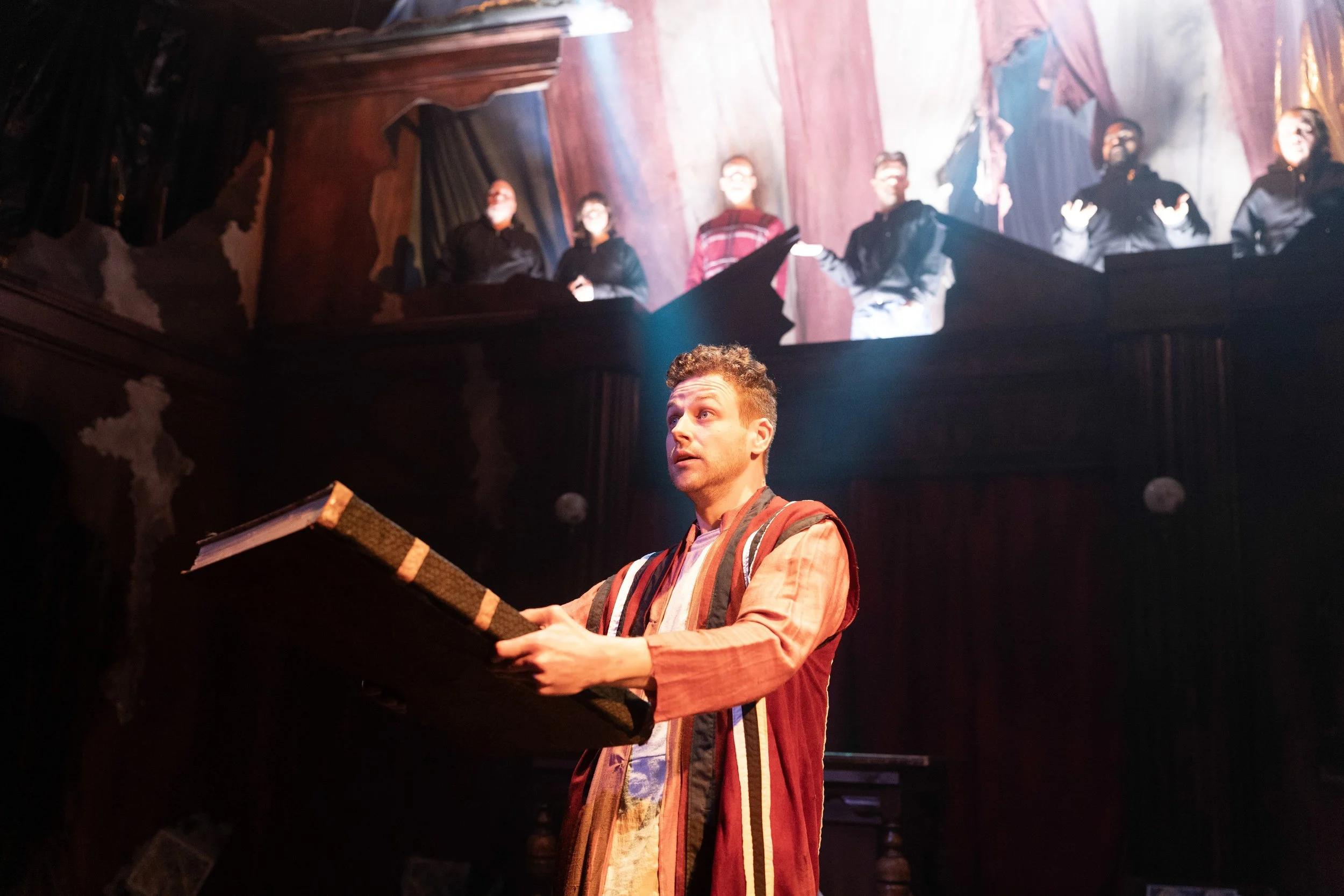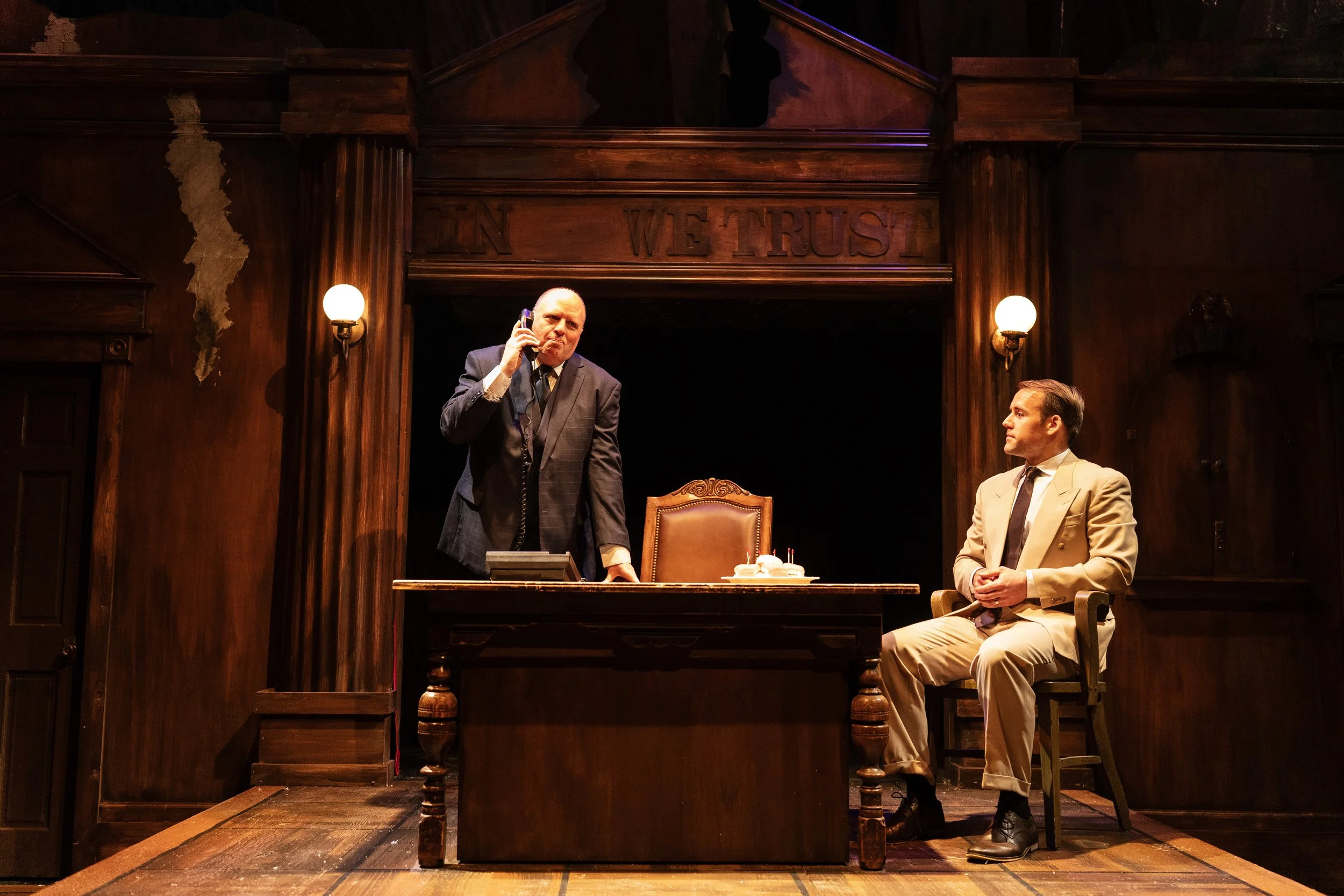Invictus Theatre: Angels In America
Ryan Hake and the cast of Angels in America
Invictus Theatre Presents ANGELS IN AMERICA Review - A Harsh Reflection of the World
TLDR: A desolate, falling apart, wounded set frames these characters living in New York during the AIDS epidemic. Invictus’ production feels true to the original play and themes that strike a chord to the happenings of today.
Nicki Rossi
The Destruction Is Evident in Invictus Theatre
Set in 1980s New York, we enter a city during the heart of the HIV/AIDS crisis. It feels like a very different New York than we know today where it’s gritty, dirty, and everything looks like it's falling apart. Tall metal stairs, scaffolding, and construction cones line the front aisle. Clear, plastic tarps hang from all the walls making it seem like we’re entering a construction zone.
The stage is split into different sections. The walls of the crumbling courtroom sitting center of the stage have rough, badly patched plaster on the walls - unfinished, rushed, still crumbling. Above the stage an oversized American flag acts as the backdrop for the action up top but is also torn to shreds. A hospital curtain covers a doorway that has crumbled edges making a rough entryway. As the house lights begin to fade only the motto above the doorframe remains - a spotlight on the “In God We Trust” as the “God” flickers in neon and then goes completely dark.
The set design by Kevin Rolfs takes us to a place that is ravaged by disease and destruction. It creates all the different places we need for Angels in America. The actors move other set pieces on and off the stage during different moments as we move from scene to scene as well. Projections tell us the time, place, and scene as we change from location to location and move smoothly from act to act.
Different Representations
A funeral.
A courtroom.
A familial home.
As we move from place to place, we're introduced to each of our main characters and how their paths cross in their daily lives. They show us different representations of how men and the worlds they live in dealt with the epidemic.
Ryan Hake as Prior Walter paints us a picture of a man in pain from the illness. He writhes on the floor of his apartment as the disease takes hold. But even as he's dealing with the worst of the illness he doesn't lose any of his chaotic good. He dramatically enters every room dressed in all black with a bedazzled headscarf. He makes friends with almost every person he meets. He sasses The Angel when she appears to him.
Grant Carriker as Louis is good heartedly neurotic. He feels a little bit like Leonard from The Big Bang Theory, overthinking and overanalyzing. He argues about semantics, he anguishes over details, he tries to assuage his guilt over a cup of coffee. He just has so many feelings that overwhelm him and he doesn’t know where to put them.
Pair him with Joe Bushell as Joe Pitt, we see how two people in the height of their emotions can fall into a relationship for all the wrong reasons. We watch the journey of a closeted gay man through Bushell as he experiences the first taste of sexual freedom and he can finally bare it all, figuratively and literally, and be free.
Michael D. Graham Roy Cohn plays into all what people say about him. He has no filter, he's constantly barking into the phone, and won't rest until he gets his name off the disbarment chopping block. His mannerisms lean slightly into the effeminate, but he's the most closeted, openly gay man in New York. He shows us how even a man who might be the most powerful attorney in New York (he is only fifteen persons away from having the first lady on the phone after all) does not want to be associated with a “homosexual” illness and yet is still powerless against it.
And then there’s Belize played by Miguel Long. He never shies away from who he is and is witness to each and every one of their storylines. He provides exactly what each of these men need - a caretaker, a wake up call, a formidable sparring opponent.
They all show us growth and change in these characters through their long journeys in both Part 1 and Part 2.
Michael D. Graham and Joe Bushell
The Slow Descent
As the play progresses and the circumstances for each person whose life is affected by the disease grow more dire, we see the mental toll it takes. Things that previously didn’t seem important to Louis like political affiliation now have the utmost importance. Cohn’s infamous trial of the Rosenbergs comes back to haunt him as he lies in a hospital bed. Prior’s previous apathy towards life turns into a desire to keep fighting and living.
The most impressive thing for this writer is how much the actors give. When Prior and Cohn’s immune systems are failing, the way they writhe in agony have us understanding exactly the kind of pain those who are living with HIV may feel. I also must give props to the other actors in the show - Nicki Rossi as The Angel, Anne Trodden as Harper, and Renae Stone as Hannah - who also have us gripped with each of their portrayals.
Angels is a heavy show to begin with and these actors bare everything and give us raw, fully formed performances that make us feel exhausted for them with how much they give in their deep and moving performances.
The After Party Thoughts
I hate being cliche and saying the themes in this play set in the 80s still strike similarities to today, but they are cliches for a reason. The play doesn’t shy away from themes of homophobia and good/evil. From the references to Reagan and the far right, to the plans for the Republican party to control Congress, to the demand for the return to “traditional family values,” all hit very close to what we're experiencing now with the current administration (not to mention the connection between Roy Cohn and Trump himself *shudders*). Angels in America still remains relevant today as it feels like history is repeating itself.
As my fellow After Party members would attest, there’s much to unpack in this play. Because there’s so many different themes and meanings, it’s hard to pick just one as the main takeaway. But, I’ll leave you with the one that struck me the most - even though times are looking like the apocalypse is near and that escaping feels like the easier option, it's better to stay and fight. We want to live.
For those that are looking for a less political, less relationship-y, less gay play, this show is not for you. However, if you are looking for a meaningful night out at the theater that makes you want to believe that the fight is not over, Angels in America would be a good fit for you.
HIGHLY RECOMMENDED
Renae Stone, Grant Carriker, Miguel Long, and Nicki Rossi
When
Now through September 21, 2025
Where
Windy City Playhouse
3014 W Irving Park Rd.
Chicago, IL 60618
Runtime:
PART ONE is approximately 3 hours with two 10-minute intermission
PART TWO is 3 hours 45 minutes with two 10-minute intermissions
Tickets
$30+
Tickets can be purchased through the Invictus Theatre Company website
Photos
Aaron Reese Boseman Photography
Find Allie and The After Party featured on Theatre in Chicago
Ryan Hake and Grant Carriker
CAST
Michael D. Graham (Roy Cohn)
Joe Bushell (Joe Pitt)
Ryan Hake (Prior Walter)
Grant Carriker (Louis Ironson)
Miguel Long (Belize)
Anne Trodden (Harper Pitt)
Renae Stone (Hannah Pitt)
Nicki Rossi (The Angel)
Understudies: Shane Roberie (Roy Cohn), Brenden Zwiebel (Prior Walter), David Lipschitz (Louis Ironson), Reid Harrison O’Connell (Joe Pitt), Rachel Livingston (Harper Pitt), Michael Ashford (Belize), Ana Ortiz-Monasterio Draa (Hannah Pitt), and Michaela Voit (The Angel).
CREATIVE
Charles Askenaizer (Director)
Tony Kushner (Playwright)
Kevin Rolfs (Scenic Designer)
Jessie Gowens (Costume Designer)
Brandon Wardell (Lighting Designer)
Rachel Livingston (Properties Design)
Todd Henry Faulstich (Executive Producer)
Stacy Scapino (Production Manager)
Sam Flipp (Stage Manager)
Beep Trefts (Assistant Stage Manager)
Tom McNelis (Technical Director)
Hannah Andruss (Wig and Makeup Designer)
Max Garcia (Assistant Lighting Designer)
Mark Brown (Production Electrician)
Ian R.Q. Slater (Dialect Coach)
Hans Herrera (Dramaturg)
Aimee Kleiman (Cultural Consultant)
Becca Holloway (Casting Director)
M.C. Dougherty (Marketing Manager)
Diego Longoria (Marketing Associate)
Ana Schedler (Graphic Design)
















